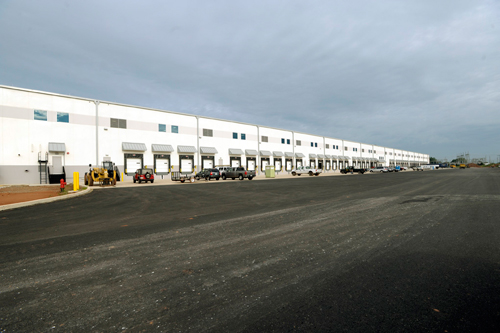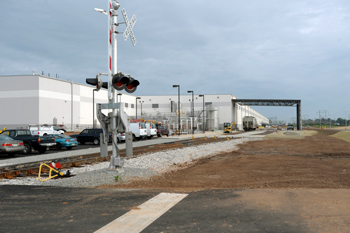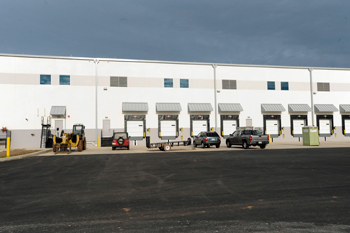 You wouldn’t blame Darrell Auterson for being gloomy about the future of York County, a longtime manufacturing stronghold on the verge of losing a major bulwark, the Harley-Davidson Motor Co. But even as Harley considers closing its York plant, Auterson finds reasons for optimism. One of the most compelling is a new plant powering up on the county’s western side.
You wouldn’t blame Darrell Auterson for being gloomy about the future of York County, a longtime manufacturing stronghold on the verge of losing a major bulwark, the Harley-Davidson Motor Co. But even as Harley considers closing its York plant, Auterson finds reasons for optimism. One of the most compelling is a new plant powering up on the county’s western side.
“The good news is that we have been very resilient and we have had a lot of innovative manufacturers that continue to find ways to compete with all kinds of domestic and global pressures on them,” says Auterson, president of the York County Economic Development Corp.
Last year, Church & Dwight Co. Inc. picked rural Jackson Township as the site of a factory for making Arm & Hammer liquid laundry detergent. The 1.2 million square-foot plant, slated to open this month, replaces an older, landlocked complex of five buildings in East Brunswick, N.J.
 “We can’t really expand there and it’s a growing business,” says Matthew Farrell, chief financial officer of Church & Dwight, based in Princeton, N.J. Sales of Arm & Hammer detergent are up 25 percent over the last nine months, a performance Farrell attributes to the product’s relatively lower price.
“We can’t really expand there and it’s a growing business,” says Matthew Farrell, chief financial officer of Church & Dwight, based in Princeton, N.J. Sales of Arm & Hammer detergent are up 25 percent over the last nine months, a performance Farrell attributes to the product’s relatively lower price.
“You have a lot of trade-down by American consumers from the high-priced and even mid-tier laundry detergents to what’s considered value,” Farrell says, “and Arm & Hammer is a name that’s been around for a long time.”
The 232-acre site in York County has room to expand production by another 1.9 million square feet. And with a more efficient layout, the new plant is expected to cut energy use by about 30 percent and waste by about 50 percent, Farrell says. Additional features include a geothermal system for heating and cooling administrative offices.
The state Department of Community and Economic Development has offered $3.25 million toward the project, including aid for infrastructure development and job training.
Before settling on York, Church & Dwight looked at more than 35 sites in six states, Farrell says. Selection criteria included property size, water supplies and access to highways and railways. A skilled workforce also was key.
“A lot’s been written about the demise of U.S. manufacturing,” Farrell says. “But I think it’s fair to say that the capability of the American worker is equal to or better than what you can get in many countries around the world. Then it comes down to whether you can, in our case, find all those other things that you need to make it cost-efficient.”
 Plenty of York workers are ready to prove Farrell right. He says the company received 6,000 applications for the first 170 positions at the plant–120 hourly and 50 salaried. By the end of the year the paid head-count should reach 300.
Plenty of York workers are ready to prove Farrell right. He says the company received 6,000 applications for the first 170 positions at the plant–120 hourly and 50 salaried. By the end of the year the paid head-count should reach 300.
That number falls well short of the 2,000-plus jobs Harley is threatening to move. The motorcycle manufacturer, hit by a steep decline in sales, is eyeing a relocation or reorganization of its York factory. Several rounds of layoffs already have trimmed the workforce there from a peak of more than 3,000.
But factories are unlikely to provide as many jobs as they have in the past. At one time, roughly half of all Pennsylvania jobs were in manufacturing, says Mark Price, a labor economist at the Keystone Research Center, a liberal think tank in Harrisburg.
“Those days, obviously, are long gone,” Price says. Production workers now make up less than 10 percent of the state’s workforce, according to the federal Bureau of Labor Statistics.
Nonetheless, several factors will ensure the U.S. and Pennsylvania continue to make stuff, Price says. A skilled work force is one. Location is another. As countries and businesses get serious about carbon emissions, they may look more closely at the pollution that comes from transporting goods.
“That does not bode well for a world where you manufacture everything really far away,” Price says.
Ever-increasing productivity is another factor behind the loss of factory jobs, a factor that is unlikely to be reversed, adds John W. Lloyd, president and chief executive officer of Mantec, a York nonprofit that offers consulting services to manufacturers.
For York County, the future depends on sustaining its diverse array of factories, which make everything from potato chips to hydroelectric turbines. Church & Dwight is bolstering the mix and helping the region smooth over rough times, Lloyd says.
“The report that keeps making the news is Harley-Davidson and they are struggling, because nobody has to buy a motorcycle,” Lloyd says. “However, you do have to buy laundry detergent.”
Joel Berg is a freelance writer, part-time writing teacher and recovering business reporter living in York. Send feedback here.
To receive Keystone Edge free every week, click here.
Photos of Arm and Hammer Plant by Brad Bower